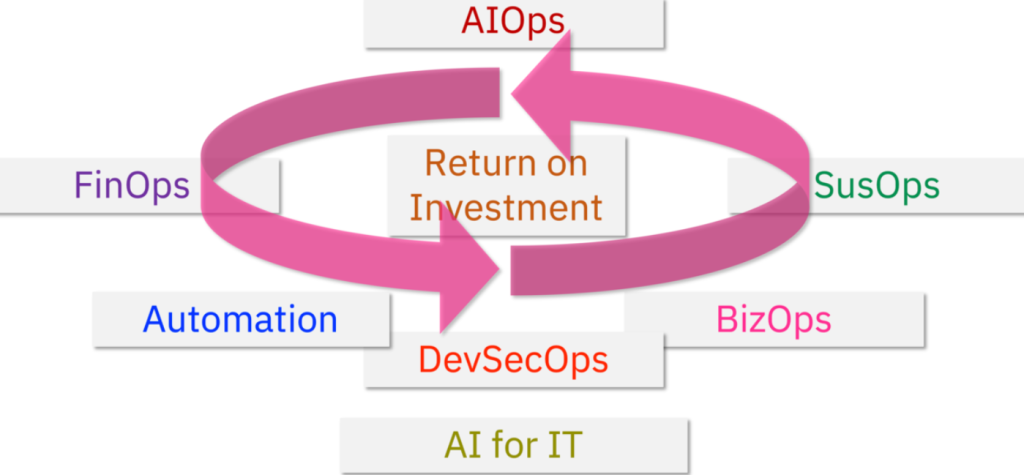
AIOps (Artificial Intelligence for IT Operations):
- Focus: AIOps focuses on using AI and machine learning to enhance IT operations by automating tasks, predicting incidents, and optimizing infrastructure performance.
- Purpose: Aims to improve the efficiency and reliability of IT operations through data analysis and automation.
- Key Benefits: Faster incident detection and resolution, proactive monitoring, reduced downtime, improved resource allocation.
AIOps (Artificial Intelligence for IT Operations): AIOps refers to the application of artificial intelligence (AI) and machine learning (ML) techniques to enhance and automate various aspects of IT operations and management. AIOps involves using data analysis and pattern recognition to detect and respond to anomalies, predict incidents, automate routine tasks, and optimize IT infrastructure performance.
FinOps (Financial Operations):
- Focus: FinOps centers around optimizing cloud spending by fostering collaboration between finance, technology, and operations teams.
- Purpose: Aims to control and optimize cloud costs, allocate resources efficiently, and make informed financial decisions regarding cloud usage.
- Key Benefits: Cost savings, better budget management, increased transparency, alignment of cloud costs with business goals.
FinOps (Financial Operations): FinOps is a framework that combines practices from finance, technology, and business operations to manage and optimize cloud spending within an organization. It focuses on collaboration between finance teams, developers, and operations to control costs, allocate resources efficiently, and make data-driven decisions regarding cloud usage.
- Focus: DevSecOps integrates security practices into the DevOps methodology, emphasizing collaboration between development, security, and operations teams.
- Purpose: Aims to ensure that security is integrated early and consistently throughout the software development lifecycle.
- Key Benefits: Enhanced security posture, reduced vulnerabilities, faster and more secure software delivery.
DevSecOps (Development, Security, and Operations): DevSecOps is an extension of the DevOps methodology that integrates security practices into the software development lifecycle. It emphasizes the collaboration between development, security, and operations teams to ensure that security measures are integrated early and consistently throughout the software development process.
DevSecOps: Development, security, and operations. It is a set of practices that combines software development (Dev), security (Sec), and IT operations (Ops) to shorten the development lifecycle and improve the security of software. DevSecOps emphasizes the importance of security throughout the development process, from the early stages of planning to the final deployment of software.
BizOps (Business Operations): BizOps refers to a data-driven approach that combines business insights with IT operations to optimize business processes, improve decision-making, and enhance overall performance. It involves aligning business goals and IT operations to achieve better outcomes, often by using data analytics and real-time monitoring to make informed business decisions.
BizOps (Business Operations):
- Focus: BizOps aligns business goals and IT operations by using data analytics to make informed business decisions and optimize processes.
- Purpose: Aims to improve decision-making, operational efficiency, and overall business performance.
- Key Benefits: Better business-IT alignment, data-driven decision-making, improved customer experience.
- BizOps: Business operations. It is a discipline that focuses on improving the efficiency and effectiveness of business operations. BizOps uses data and analytics to identify and eliminate waste, improve processes, and make better decisions about business operations.
SusOps (Sustainability Operations): SusOps involves integrating sustainable practices into operational processes within an organization. This could include reducing environmental impact, improving energy efficiency, managing waste responsibly, and adopting eco-friendly practices in day-to-day operations. SusOps aims to balance operational efficiency with environmental and social responsibility.
SusOps (Sustainability Operations):
- Focus: SusOps integrates sustainable practices into operational processes to reduce environmental impact and promote responsible resource management.
- Purpose: Aims to balance operational efficiency with environmental and social responsibility.
- Key Benefits: Reduced carbon footprint, improved resource efficiency, positive brand image, compliance with sustainability goals.
here is a comparison of AIOps, FinOps, DevSecOps, BizOps, and SusOps:
| AIOps | FinOps | DevSecOps | BizOps | SusOps |
|---|---|---|---|---|
| Uses AI and ML to automate IT operations tasks | Brings together IT and finance to optimize the cost of IT operations | Combines software development, security, and IT operations to shorten the development lifecycle and improve the security of software | Focuses on improving the efficiency and effectiveness of business operations | Focuses on making IT operations more sustainable |
| Can help to improve IT operations efficiency, reduce costs, and improve decision-making | Can help to optimize IT spending, improve visibility into IT costs, and make better financial decisions | Can help to shorten the development lifecycle, improve security, and reduce the risk of breaches | Can help to improve business processes, make better decisions, and increase agility | Can help to reduce the environmental impact of IT operations |
AIOps, FinOps, DevSecOps, BizOps, and SusOps are all important disciplines that can help organizations improve their IT operations. The best discipline for an organization will depend on its specific needs and goals.
